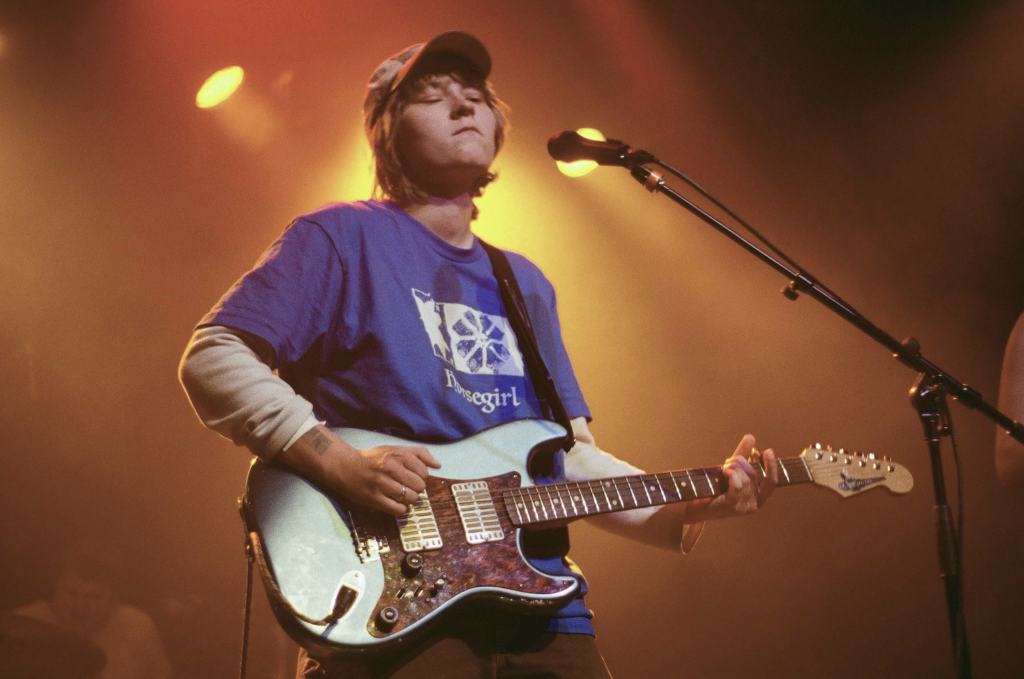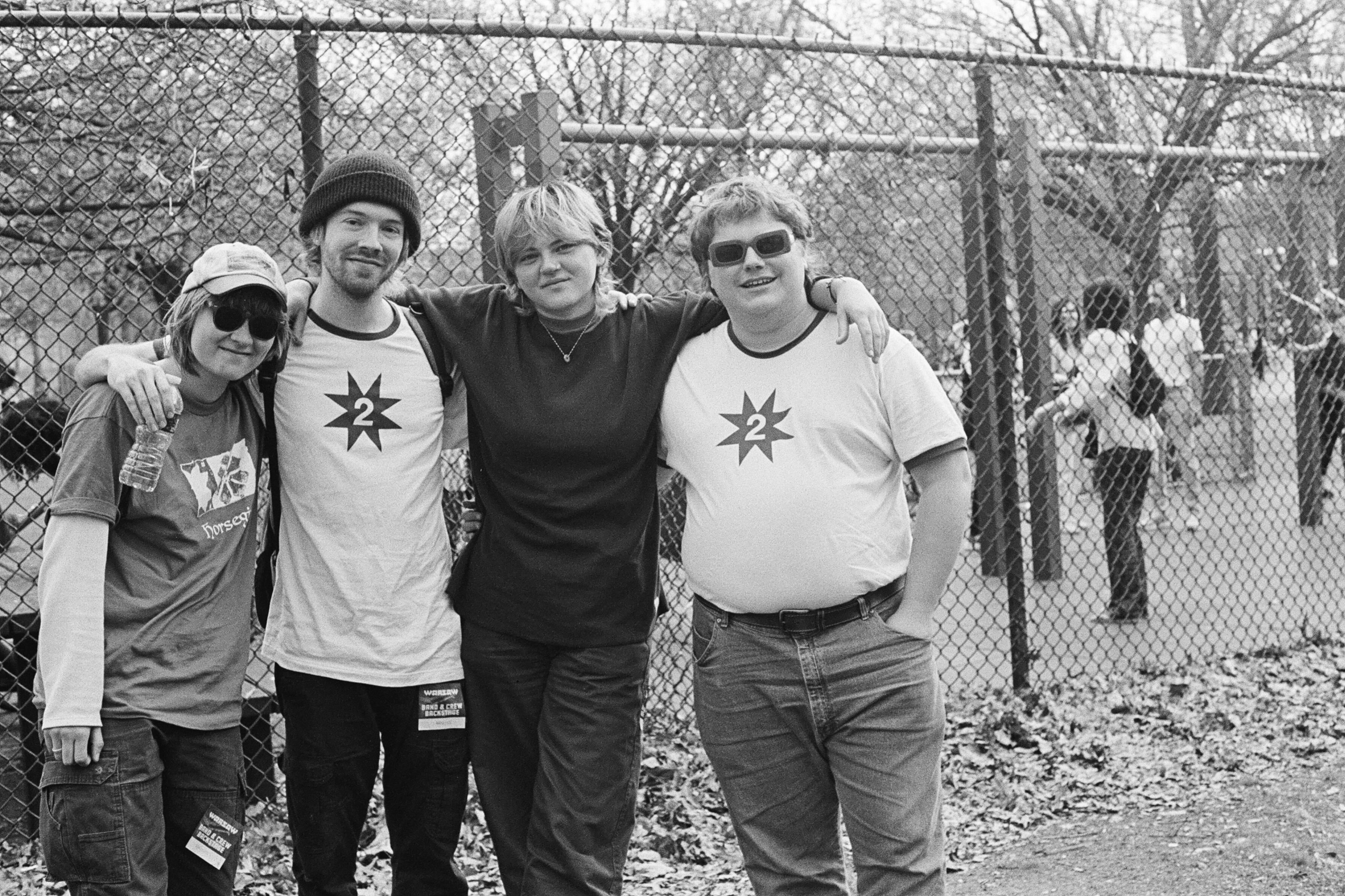Sofia Jensen and I are rolling up our shirtsleeves to compare tattoos. We are standing outside of Greenpoint’s Warsaw on the first sweaty New York day in months, and Jensen, who fronts the band Free Range, is deciding whether we should grab a slice of pizza or frolic in the park. It’s only moments after our meeting, both dressed in T-shirts and worn denim, that we realize we’re sharing nearly identical shapes on our arms: miniature, hand-poked ampersands.
I met up with the Chicago-spawned band Free Range just a few hours before the last night of their tour opening for Horsegirl. It’s the second time I’ve spoken with Jensen this month, but the first that I’m getting to spend time with the entire band. Once they unpack their van at the venue, I watch them each take a drag of a somewhat-communal cigarette’s end. We make small-talk about home and driving and the number of listenable New York guitar bands. They’re each at the stage in their career where home is a rented minivan and driving across state lines is a daily rite. It’s not such a bad life for Jensen, who recently got their license and enjoys the cross-country road trips.
The meaning of the “&” permanently inked in Jensen and I possess the exact same origin story: a youthful, yet definitely still lingering, obsession with the New Jersey band Pinegrove. The ampersand serves as Pinegrove’s emblem of collectivism, a proclivity for literature, and a desire for a deeply sincere togetherness—a few predilections Jensen shares to justify the permanent ink. But philosophical reverences aside, the tattoos may well just be a manifestation of how badly we both wanted to be Pinegrove members in high school—which Jensen got a bit closer to, as rotating Pinegrove guitarist Nick Levine contributed slide guitar on Free Range’s debut album, Practice.
Each Free Range member and I sing-stroll our way over from Warsaw toward a very busy McCarren Park While fusing verses of Pinegrove’s Marigold together with some one-liners from the iCarly soundtrack. We find a tree cavity for our backs, forming a circle, hands in the dirt. We come prepared with a frisbee just in case time permits.

Free Range is the brainchild of 21-year-old Jensen, who started the project with a lineup of high school friends, who no longer play in the band, when they were just 15. They would make GarageBand arrangements to put on Bandcamp and play with friends in any basement where their mom would drop them off. “I remember when things came to me while I was at school and away from my guitar, and I would run to the high school bathroom and record voice memos or type lyrics into my notes app multiple times a day,” Jensen said. “Those were the moments that I realized I had so many ideas.”
The band put out their sophomore album, Lost & Found, the day prior to our meet-up. The album deepens the Free Range sound with a violin, Dylan-esque harmonica, heavier amounts of electric guitar, harder riffs, and achy breakthroughs. By and large, Jensen has created a sound that’s just as wooden rocking-chair as it is rock and roll, reminding of the country-not-country fervor honed by acts like Wilco or Lucinda Willams, who also predictably serve as Jensen’s lodestars.
Jensen, a born and raised Chicagoan, broke out from the crowded scene of teenaged bands ranging from TV Buddha, Lifeguard, and Post Office Winter, as well as their recent tour companions, Horsegirl. The scene, perhaps only from afar, represents a significant cultural mark for Midwest teens who grew up in an age which feels entirely dissonant from spaces defined by a physical, collaborative, and radical youth-led music initiative.
Their sound, though, has long stood out from the aforementioned scene’s noisy, taut postpunk. Since their debut in 2023, Free Range has melded a sound more nostalgic for the 1960s underground folk scene, or an adjacent Texas outlaw honky-tonk, flying closest to the folk-rock and alt-country skies.
Sitting in our summer camp-like semicircle, the band is actively coming down from a high. They played in Woodstock, New York, the night of the album’s release, and besides listening to the iCarly soundtrack, they’ve been reading Lost & Found album reviews together in the car, mulling over the compliments, potentially hidden insults, and sometimes blatant inaccuracies.
“I realize they’re all going off of stuff I said and sent out in the press release. When I read back at the stuff that I wrote,—like I said that—I’m like, that’s not fucking true at all! Why did I say that?” Jensen said. “ ‘Hardly,’ for example, I didn’t know what to say that song was about, so I completely bullshitted it. I said it was about seeking connection. And now it’s published everywhere.”

When I talked to Jensen earlier that month about their writing process for the album, the sentiment was similar, admitting that “sometimes the songs are not about very much at all.” They mentioned the struggle of trying to condense the content of the album into a few digestible themes in order to better explain it to reporters or whoever else.
“It’s hard to think about because each song was written independently of each other. I sometimes forget what I mean by Lost & Found, but there’s meaning in there I’m sure.”
Years prior to releasing their debut album, Practice, in 2023, Jensen met drummer Jack Henry, who then brought bassist Bailey Minzenberger into the project. In between release cycles, guitarist Andy PK joined, too. Henry, Minzenberger, and PK play in a multitude of other impressive Midwest acts, including Friko, Hemlock, Morinda, and Andy’s solo project, Red PK.
“You’re just a songwriter. That’s what you do–write about lived experiences,” Henry added. Andy added that the album is like Senfield, “a show about nothing.” The Seinfeld references continue for the rest of the interview.
Part of Free Range’s homegrown sound has the production of Tommy Read, his sister Hannah (indie-folk musician Lomelda), and Eric Adams of Acre Memos to thank. The three demoed Jensen’s initial slew of 50 songs in the quiet of East Texas’ Silsbee, narrowing the tracklist down to 13.
The material of Lost & Found was written over a four-year period, largely while Jensen was then in a long-distance relationship. “I tend to make every song, in whatever sense, about my place in the lives of other people. About how we help each other, fail to help each other, the limitations of our love, what we want it to be and when it’s not. I have a lot of lines about being in a long-distance relationship and having physical distance from someone. Although sometimes it’s not always physical.”
Lost & Found begins in what feels like the midst of this distance. “Tilt” rings the new album in with Jensen’s voice at first accompanied, stunning and confrontationally raw, immediately rendering the track’s narrator as not merely older but more assured. The song’s piano arrangement accompanied by Macie Stewart’s necessary violin constructs an eerie lullaby, and when the instrumentals do inevitably break open in a swell, Jensen follows by breaking open on the page: “It’s a timing thing/Where you know you’ll leave/And then you’ll never wanna go home.”
The namesake track serves as the album’s crux. The lyrics, inspired by Jensen’s “need to reconnect with a childlike wonder,” noted that the experience of writing this album felt similar to what they once knew. “I just feel like a kid, giggling, and ignoring calls in my room playing my guitar as if it’s a video game.”
There’s one stanza which feels particularly resonant to the childlike wonder in which Jensen’s writing is derived:
Wrote my name with the sidewalk chalk
Making loops in the parking lot
Where everyday you would come around
And walk me down to the lost and found
“I really liked the imagery of being led by the hand of someone else, almost as if I’m a kid being led by an adult to the lost and found at a community center. Something about that was so innocent and sad to me, and I really relate to it–I lose my shit all the time. There’s something about being led when I want this thing, and I don’t know where it is, and I don’t know how to find it. There could just be one box to go look for it and find all the answers. If that were to exist for everything you lost–people, memories, things you can’t reach anymore–I like that idea.”
The album comes two years after Free Range’s debut Practice, which had a far more teenaged spine, packed-to-the-brim with metaphorical longings about escaping home (whether that be a physical home, or the home within each of us). Although Practice came out only two years ago, the songs were all written up to six years ago–at the ages of 15 and 16–rendering them somewhat nonsensical to Jensen now and mentally difficult to play live.
Over Zoom earlier that month, Jensen and I spoke about Practice’s homespun, quietly impactful origins at length, perhaps only for my own sake given their detachment to a significant portion of the album. Jensen had driven down to play ten off-SXSW shows, and called me from a shoebox-sized Austin apartment on their day off. I ask about the namesake track, “Free Range” in particular, which is one of the few Jensen feels like they can still wholly get behind. “To me that song is about what it means to be an artist, and not wanting to be restricted or scared of exploring ideas. What does it mean to devote your life to being curious about stuff? That’s what being an artist is to me, at least in part.”
“Free Range” was written by Jensen in the middle of the night, when Jensen had to decide whether to keep following the idea or go to sleep for school the next day. A lot of Practice’s lyrics were written in a similar vein. Like many teenagers living in their parents house, Jensen was dreaming of getting out on the road, searching for something to stick. That is, something other than sophomore year of high school.
Lost & Found, perhaps, confronts what Practice was too young to do. “A lot of the songs I wrote are in pretty emotional states. Not all of them, but definitely when I listen to them now, it’s very apparent to me what I was writing, and that I know exactly who I was writing about.” They let out a laugh while saying a lot the songs were “probably written in the middle of the night, with a tear streaming down my face.”
Tonight, Jensen takes Warsaw’s stage at around 9pm. It’s an entirely Chicago-studded night, as they’re sandwiched between the rock band Answering Machines and Horsegirl, the headliner.
The venue is full of those just barely entering life’s second decade, with shaggy haircuts and patchwork tattoos to show for it. There’s also, unsurprisingly, an abundance of dad-rockers, who stand and sway in the background, fisting warm beer with their backs against the sound booth.
Jensen’s stage presence is hard not to pay attention to. Droll and endearing, switching back and forth between the electric and acoustic guitar, they break from almost each song to speak to the crowd about topics ranging from the ongoing genocide in Palestine to the Andy becoming an uncle, paying no mind to the microphone’s muzzy feedback.
After their set, Jensen watches from the top floor of the venue as Horsegirl plays their recently released album from front-to-back. It’s a bittersweet, somewhat full-circle moment witnessing the week of touring with childhood friends come to a close, and they’ve chosen to document it with a janky camcorder that has just two minutes left to spare on tape. They’ve been recording moments on this old and used camcorder throughout the entire tour, with the intention to form some kind of visual archive to hold on to. For Jensen, tonight and well after the tour wraps up, making and sharing music is not solely about selling out standing-room only space at Warsaw, but it’s about the collective experience of sharing the thing that makes us each feel so deeply and intensely alive.
“That moment of feeling like the whole world exists within a song—I personally have not experienced a better feeling. Sometimes it seems like all I do is chase a feeling, as if it’s a high or something. But when you’re losing track of time, excited to be awake, excited to be alive, it makes me feel as though I could do this for years. That is so cool.”


